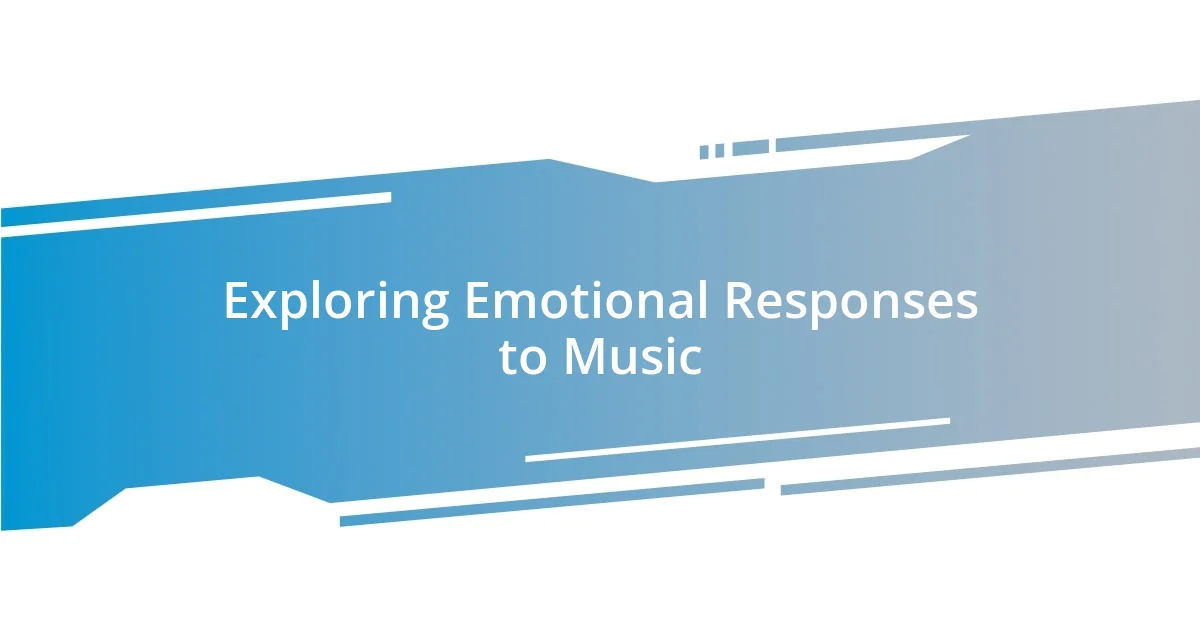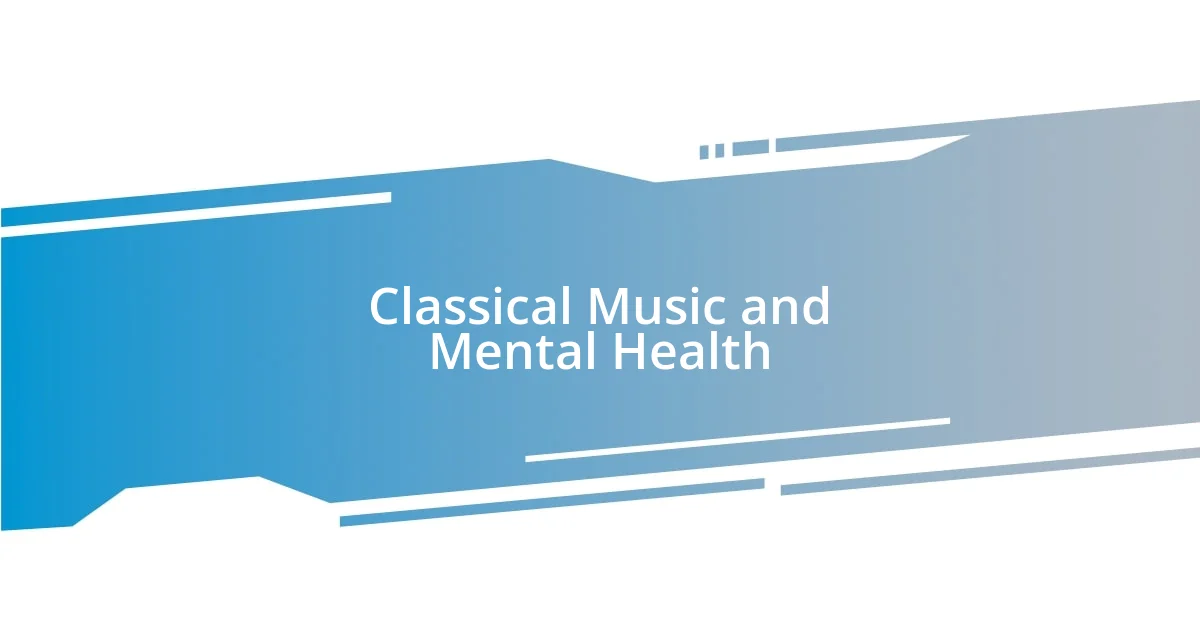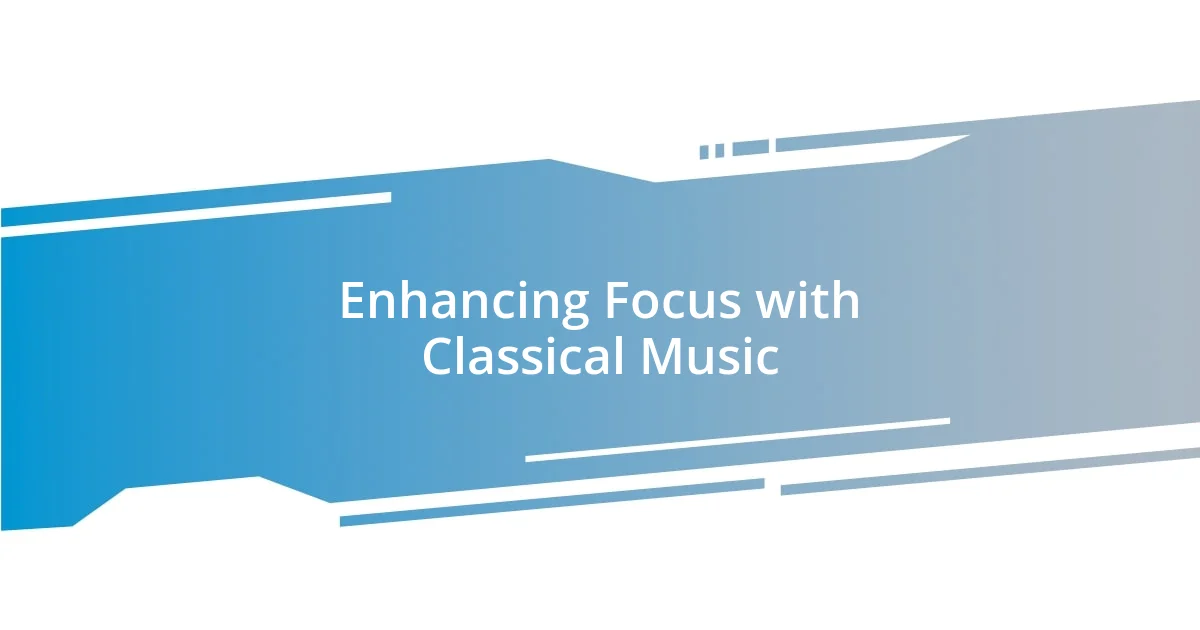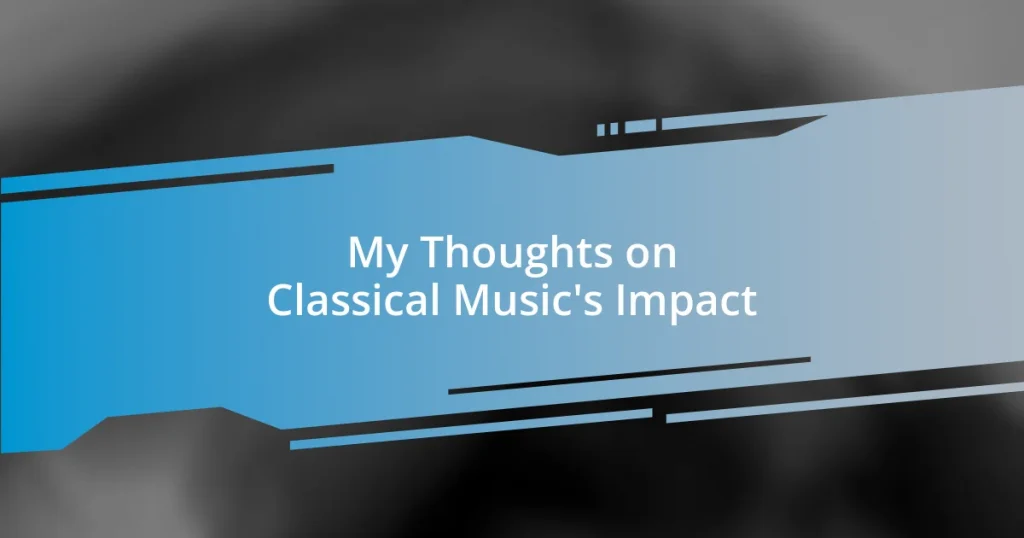Key takeaways:
- Classical music serves as a timeless emotional bridge, connecting listeners to their past and enhancing cognitive functions, such as concentration and creativity.
- Engaging with classical music can significantly improve mental health by reducing anxiety, boosting mood, and providing comfort during stressful times.
- Recommended pieces like Beethoven’s “Symphony No. 9,” Vivaldi’s “The Four Seasons,” and Tchaikovsky’s “Swan Lake” highlight the emotional depth and storytelling power of classical music.

Understanding Classical Music’s Importance
Classical music holds a unique place in our cultural landscape, serving as a bridge across centuries. Every time I listen to a Beethoven symphony, I marvel at how his emotions—joy, sorrow, triumph—feel just as relevant today. Isn’t it fascinating how music can transcend time and connect us to the past?
I remember attending a live performance of a Mozart concert. The way the orchestra ebbed and flowed captured my heart; it felt like they were telling a story without words. Classical music often communicates feelings that are sometimes hard to express. How many times have you found solace in a piece that resonated with your mood?
The importance of classical music also lies in its role in education and cognitive development. Studies have shown that exposure to classical works can enhance brain functions, from improving concentration to boosting creativity. Thinking back to my own experiences, practicing piano pieces by Chopin blossomed not just my musical skills, but also my analytical thinking—could this more profound impact be the reason our society values classical music so highly?

Exploring Emotional Responses to Music
When I listen to the mournful strains of a Chopin nocturne, I can’t help but feel the weight of nostalgia. There’s something deeply personal in the way music interacts with our emotions. It can transport us to moments frozen in time, like the memory of dancing with a loved one or the bittersweet pang of a goodbye. I’ve often found that a single note can evoke a whole orchestra of feelings, revealing layers of my psyche I didn’t know existed.
- Music can trigger memories, connecting us to past experiences.
- Certain classical pieces can uplift spirits, while others comfort in sadness.
- I’ve felt my mood shift dramatically just by switching from Vivaldi’s jubilant “Spring” to the solemn beauty of Bach’s “Air.”
- Each genre elicits different responses; a lively concerto can energize, while a serene adagio provides peace.
Listening to music offers a unique emotional dialogue, sometimes even speaking to parts of me that words cannot reach. Whether it’s the triumphant chords of a Beethoven score or the delicate phrasing of a Debussy piece, I often find that these emotional responses create poignant moments of reflection. How does music weave its way into your heart?

Classical Music and Mental Health
When I turn on classical music during a stressful day, it feels like a wave of calm washes over me. Research indicates that listening to classical compositions can significantly reduce anxiety levels. Personally, I’ve noticed that the soothing harmonies of Debussy can transform my worries into a sense of peace, allowing me to approach challenges with a clearer mind.
I still remember a particularly chaotic week last year when I was overwhelmed with work and life commitments. Playing the gentle melodies of Eric Satie helped me focus and process my feelings. It’s fascinating how certain pieces, like Grieg’s “Morning Mood,” invigorate me, while a somber piece like Mahler’s “Adagietto” brings a sense of reflection. The contrast in moods can be surprisingly therapeutic, guiding my mental state towards clarity.
Looking at the broader picture, many studies support the idea that classical music aids in reducing symptoms of depression. I recall discussing with a friend how listening to Tchaikovsky on gloomy days often lifts their spirits, echoing my own experience. Classical music doesn’t just entertain; it can be a formidable companion for our mental health journeys.
| Classical Music Benefits | Mental Health Impact |
|---|---|
| Reduction of Anxiety | Soothes the nervous system, lowers stress levels |
| Enhancement of Mood | Boosts positivity and combats feelings of sadness |
| Cognitive Stimulation | Improves concentration and enhances overall mental clarity |

Enhancing Focus with Classical Music
When I need to buckle down and focus, I often turn to classical music, and it really makes a difference. It’s like I can feel my mind shift into a higher gear, especially with some of Bach’s intricate fugues playing in the background. Have you ever noticed how certain melodies seem to create a sonic bubble that helps you drown out distractions?
I vividly recall a time I was preparing for an exam, and every time I hit a wall, I’d put on Mozart’s “Piano Concerto No. 21.” The fluidity of his compositions inspired a sense of clarity I desperately needed. That piece felt like a gentle guide, nudging my thoughts back into line whenever they strayed. It’s almost magical how a few well-placed notes can help me regain focus and productivity.
Interestingly, research suggests that classical music can stimulate the brain in a way that enhances cognitive function, bolstering our concentration levels. I sometimes wonder if musicians themselves experience this focus when they perform. I know when I’m immersed in a piece, the world fades away, allowing me to connect deeply with the music and my tasks. Isn’t it fascinating how something so fluid and emotional can also serve such a practical purpose?

Recommended Classical Compositions for Everyone
When it comes to classical music that I believe everyone should experience, I always recommend Beethoven’s “Symphony No. 9.” The emotional depth of the “Ode to Joy” finale resonates in such a powerful way that it can elevate your mood instantly. I remember the first time I heard it live; the sheer energy of the orchestra left me feeling invigorated, as if I were part of something much larger than myself. Have you ever felt that rush of inspiration? It’s a unique experience that this composition delivers beautifully.
Another gem worth exploring is Vivaldi’s “The Four Seasons.” Each of the concertos evokes a different feeling tied to the seasons, and I often find them reflecting my own moods throughout the year. For example, “Winter” sends chills down my spine, even while it warms my heart with its intensity. These pieces are like musical snapshots of nature, inviting you to feel and remember the beauty of change. Have you taken a moment to listen closely to the melodies?
Lastly, I can’t overlook the influence of Tchaikovsky’s “Swan Lake.” The sweeping emotional arcs in this ballet score deeply resonate with anyone who has ever experienced love and loss. I recall attending a staging of the ballet, and the haunting strings still echo in my mind, reminding me of life’s ephemeral nature. Each note tells a story, pulling you into the heart of its tragedy. Isn’t it amazing how a few notes can convey such profound feelings? I believe that engaging with these compositions can spark a deeper appreciation for the emotional communication music offers.
















